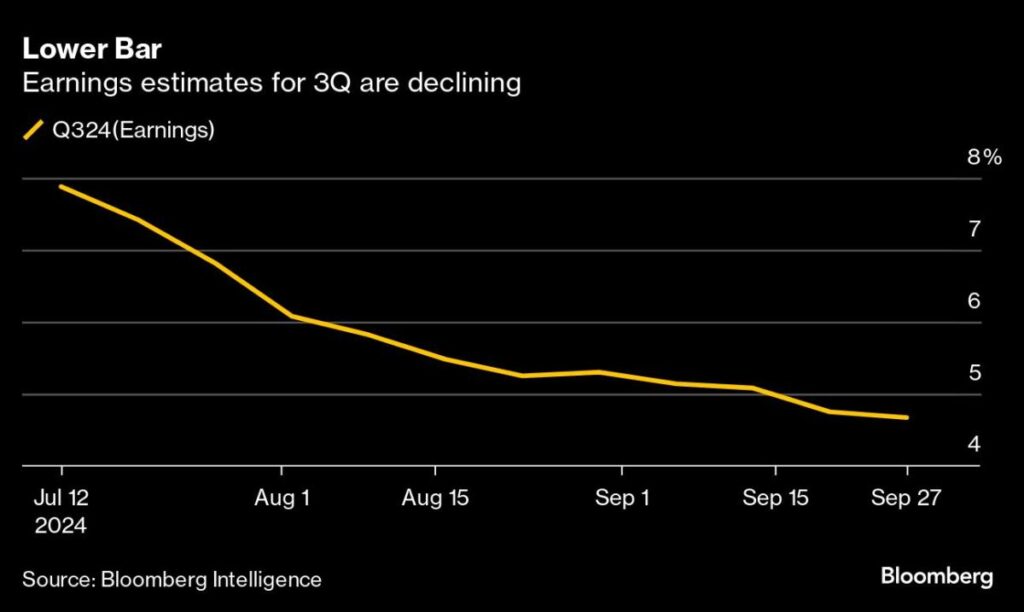(Bloomberg) — Traders are staring down a series of risks after the stock market’s torrid start to the year, from economic fear, to interest rate uncertainty, to election angst. But perhaps the most important variable for whether equities can keep rolling returns to the spotlight this week: corporate earnings.
Most Read from Bloomberg
The S&P 500 Index has soared roughly 20% in 2024, adding more than $8 trillion to its market capitalization. The gains have largely been driven by expectations of easing monetary policy and resilient profit outlooks.
But the tide may be turning as analysts slice their expectations for third-quarter results. Companies in the S&P 500 are expected to report a 4.7% increase in quarterly earnings from a year ago, according to data compiled by Bloomberg Intelligence. That’s down from projections of 7.9% on July 12, and it would represent the weakest increase in four quarters, BI data show.
“The earnings season will be more important than normal this time,” said Adam Parker, founder of Trivariate Research. “We need concrete data from corporates.“
In particular, investors are eager to see if companies are postponing spending, if demand has slowed, and if customers are behaving differently due to geopolitical risk and macro uncertainty, Parker said. “It is exactly because there is a lot going on in the world that corporate earnings and guidance will particularly matter now,” he said.
Reports from major companies start arriving this week, with results from Delta Air Lines Inc. due Thursday and JPMorgan Chase & Co. and Wells Fargo & Co. scheduled for Friday.
“Earnings seasons are typically positive for equities,” said Binky Chadha, chief US equity and global Strategist at Deutsche Bank Securities Inc. “But the strong rally and above-average positioning going in (to this earnings season) argue for a muted market reaction.”
Obstacles Abound
The obstacles facing investors right now are no secret. The US presidential election is just a month away with Democrat Kamala Harris and Republican Donald Trump in a tight, fierce race. The Federal Reserve has just started lowering interest rates, and while there’s optimism about an economic soft-landing, questions remain about how fast central bankers will reduce borrowing costs. And a deepening conflict in the Middle East is raising concerns about inflation heating up again, with the price of West Texas Intermediate oil rising 9% last week, the biggest weekly gain March 2023.
“The bottom line is that revisions and guidance are weak, indicating lingering concerns about the economy and reflecting some election year seasonality,” said Dennis DeBusschere of 22V Research. “That is helping set up reporting season as another uncertainty clearing event.”
Plus, to make matters more challenging, big institutional investors have little buying power at the moment and seasonal market trends are soft.
Positioning in trend-following systematic funds is now skewed to the downside, and options market positioning shows traders may not be ready to buy any dips. Commodity trading advisers, or CTAs, are expected to sell US stocks even if the market stays flat in the next month, according to data from Goldman Sachs Group Inc. And volatility control funds, which buy stocks when volatility drops, no longer have room to add exposure.
History appears to side with the pessimists, too. Since 1945, when the S&P 500 gained 20% through the first nine months of the year, it posted a down October 70% of the time, data compiled by Bespoke Investment Research show. The index gained 21% this year through September.
Bar Lowered
Still, there’s reason for optimism, specifically a lowered bar for earnings projections that leaves companies more room to beat expectations.
“Estimates got a little bit too optimistic, and now they’re pulling back to more realistic levels,” said Ellen Hazen, chief market strategist at F.L.Putnam Investment Management. “It will definitely be easier to beat earnings because estimates are lower now.”
In fact, there’s plenty of data suggesting that US companies remain fundamentally resilient. A strengthening earnings cycle should continue to offset stubbornly weak economic signals, tipping the scales for equities in a positive direction, according to Bloomberg Intelligence. Even struggling small-cap stocks, which have lagged their large-cap peers this year, are expected to see improving margins, BI’s Michael Casper wrote.
Friday’s jobs report, which showed the unemployment rate unexpectedly declined, quelled some concerns about a soft labor market.
Another factor is the Fed’s easing cycle, which has historically been a boon for US equities. Since 1971, the S&P 500 has posted an annualized return of 15% during periods in which the central bank cut rates, data compiled by Bloomberg Intelligence show.
Those gains have been even stronger when rate-cutting cycles hit in non-recessionary periods. In those cases, large caps posted an averaged annualized return of 25% compared with 11% when there was a recession, while small caps gained 20% in non-recessionary periods compared with 17% when there was a recession.
“Unless earnings are a major disappointment, I think the Fed will be a bigger influence over markets between now and year-end simply because earnings have been pretty consistent,” said Tom Essaye, founder and president of Sevens Report Research. “Investors expect that to continue.”
Most Read from Bloomberg Businessweek
©2024 Bloomberg L.P.
Read the full article here

